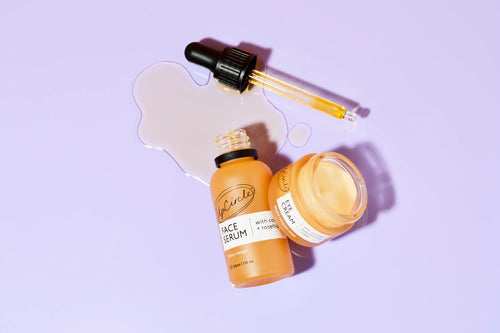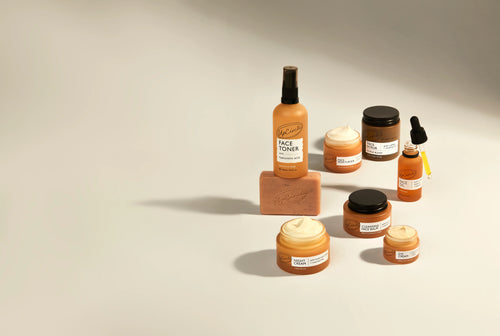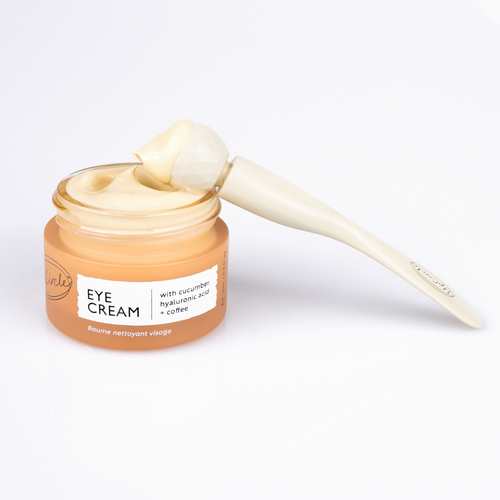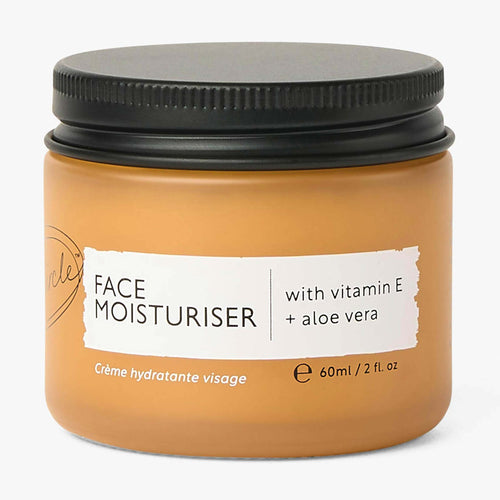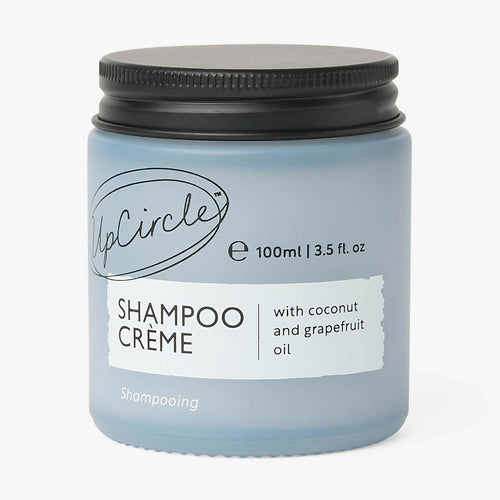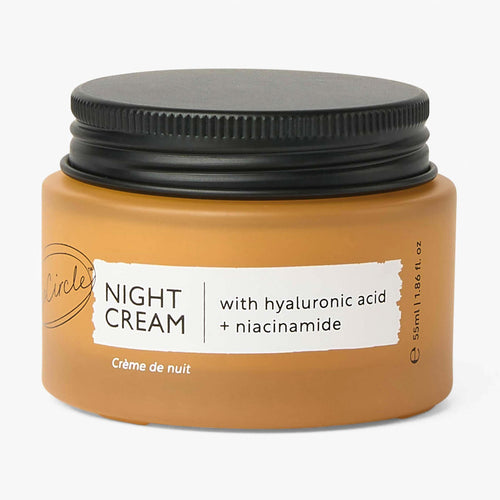Are you savvy when it comes to knowing all the skincare terms you need to get a healthy and glowing complexion? Do you know your AHA from your squalene? Do you feel lost when trying to figure out what’s actually in the product in front of you?
If you’ve ever confused your peptides and your parabens, don’t worry. We’ve got your back with our skincare glossary. Get up to speed with the UpCircle guide to the A-Z of the essential skincare terms you need to know.
Acids
Acids naturally occur in all sorts of skincare ingredients and they certainly have their place. Indeed, many acids are very important in skincare, such as hyaluronic acid which you can find in our face toner. Salicylic acid is another one which can be very beneficial for your skin, including as a natural exfoliant. Different acids can be used to help with outbreaks, age spots, blemishes and wrinkles.
AHA
Alpha Hydroxy Acids (or AHAs) are animal- or plant-based acids which work as a natural exfoliant for the skin. AHAs remove dead skin and pave the way for new cells to form for a radiant complexion. They are often listed in skincare products as glycolic acid or citric acid.
Antioxidants
Antioxidants protect the skin from impurities and air pollutants, such as smoke and UV rays. They are natural vitamins that, when applied topically in skincare treatments, can help to reduce fine lines and calm irritated skin. They are great for mopping up the free-radicals we’re exposed to through everyday life.
Bakuchiol
This powerful antioxidant and skincare ingredient is found in the seeds and leaves of the Psoralea corylifolia plant. It has a calming effect on sensitive skin and is often used in serums and moisturisers designed for acne-prone complexions.
BHA
BHA stands for Beta Hydroxy Acid. While it’s a similar ingredient to AHA, BHA is oil-soluble and works deeper into the skin’s pores. This makes it better suited to oily or blemished skin. BHAs are sometimes listed as salicylic acid in skincare products.
Blackheads
A type of acne, blackheads are open pores that become filled with excess oil or sebum. They can be the bane of your skincare life!
Blue light
Blue light is one of the light colours you can see, but we hear much more about it because it is emitted from our screens. It’s also one of the light colours we are exposed to from the sun, and with the other colours it makes up white light.
Like UV rays, your exposure to blue light should be balanced. Some exposure is good for you; it can even be used to treat skin conditions like psoriasis and acne. But too much blue light has been shown to lead to skin cell changes which speed up the ageing process and cause greater pigmentation.
Ceramides
Ceramides are oils that are essential in hydrating the skin and retaining moisture for a plumper, firmer complexion. Applying a moisturiser that contains ceramides will help to protect and maintain the skin’s barrier.
Chemical sunscreen
The vast majority of sunscreens are chemical, rather than mineral. Sunscreen with a high SPF is important for skincare. However, it’s important to try getting protection naturally, using mineral sunscreen. Chemical sunscreen is causing problems to marine life. More studies need to be done, but some chemical sunscreen ingredients are being linked with endocrine disruption and other long term health concerns. Follow our guide to choosing an SPF.
Collagen
Collagen is a hugely important protein that occurs naturally in your skin and other connective tissues. Your body produces less collagen as you age. As such, you’ll see collagen included in many skincare products for mature skin.
Comedogenic & Non-Comedogenic
If a product is described as comedogenic, it means it is likely to clog skin follicles and form pimples. Non-comedogenic products do not block pores and are light enough to allow the skin to breathe, reducing the risk of breakouts. Look for non-comedogenic wherever possible for blemish free skin.
Emollient
An emollient is often simply the term given to a moisturiser. Applied directly to the skin, they offer hydration and bring about smoothness. However, emollients are actually much more intense than the standard moisturiser and can be used to help with a range of different dry skin conditions. Emollients come in different forms, ranging from lotions and creams to bath products.
Emulsion
In skincare, emulsions are lightweight water-based moisturisers, rather than oil-based options. They are applied lightly and thinly, then absorbed into the skin very quickly, carrying any active ingredients where they need to go.
Ethoxylated ingredients
Ethoxylation is a process to make some cosmetic ingredients less harsh. The process itself isn’t bad, it’s just that it has been found to leave behind very small amounts of carcinogens. Obviously we don’t want these in our cosmetics and skincare. Ethoxylated ingredients are unfortunately sometimes used in liquid soap and bubble bath. Look out for ingredients ending in ‘eth’.
Fatty acids – Omega 3 and 6
Omega 3 and Omega 6 fatty acids are excellent for your skin and can be applied topically. They are exceptional for hydrating the skin as they seal in moisture and reduce evaporation. When used in skincare they leave skin smooth and supple, but also help to repair the skin and even reduce UV-damage from the sun.
Fragrance-Free Skincare
Not everyone can tolerate fragranced products and many people prefer fragrance-free skincare products which are designed for those with easily irritated skin. Odourless skincare products do not contain any natural or synthetic fragrances. Alternatively, choose naturally fragranced products – like any in the UpCircle range.
Free Radicals
Molecules that damage skin cells are known as free radicals and can be caused by pollution, toxins, dust and UV rays. These pesky molecules can cause fine lines, discolouration and loose skin. Unfortunately, being exposed to free radicals is part and parcel of modern daily life.
Glycolic Acid
A type of AHA derived from sugar cane.
GMOs
Genetically modified organisms (GMOs) have had their characteristics changed in a lab to make them more desirable. The result is genetic modification that doesn’t occur naturally. They are frequently used in mainstream skincare, for example GMO canola to increase levels of lauric acid in soap. More research needs to be done, but ingesting some GMOs have shown a range of health problems. Therefore, we don’t want them in our skincare either!
Hyaluronic Acid
Hyaluronic Acid is what gives the complexion its structure and a hydrated look. It’s best known for minimising the signs of ageing and is a common ingredient in night creams. Despite its strange sounding name, it’s all-natural and a skincare wonder compound.
Hyperpigmentation
Hyperpigmentation is very common and more likely with age. It’s harmless, but many people don’t enjoy experiencing hyperpigmentation. It is when patches of the skin become darker compared to other areas. It’s a result of excess melanin. It can also be the term used to describe lingering redness from a spot. Hyperpigmentation has different causes including sun exposure, ageing, inflammation and hormonal changes. Skincare products like vitamin C and retinol can help combat hyperpigmentation.
Millia
A small, hard cyst formed of a skin protein called keratin. Usually white, these harmless bumps form in clusters on the face. They are also known as ‘milk spots’ and are common in babies.
Niacinamide
A Vitamin B3 that is found in skincare products, niacinamide is particularly effective in revitalising the delicate skin around the eyes and reducing signs of hyperpigmentation.
Occlusives for skin
Occlusives are ingredients that lock in hydration. They can’t increase moisture levels, but they can help to prevent water from draining from the epidermis. Petroleum jelly is one of the most common occlusives.
Parabens
Parabens are synthetic preservatives that are added to skincare products to extend their shelf life. Our natural skincare products do not include parabens.
Peptides
Peptides are amino acids that improve the elasticity of the skin. Often found in moisturisers, they can give the appearance of firmer, bouncier and younger-looking skin.
PHAs
Poly Hydroxy Acids — aka PHAs — are part of the same family as AHAs and work by exfoliating dead cells on the surface of the skin. Products containing PHAs are especially effective in reducing the effects of the sun’s rays.
Phthalates
Phthalates are sometimes referred to as plasticisers. They help to dissolve other materials and can make plastics more durable. They are in many types of plastic packaging used in cosmetics and skincare, but also within the cosmetics themselves – especially in products like fragranced lotions, nail polish, hair care and body wash.
Pro-Retinol
This ingredient gives skin a boost of Vitamin A to reduce the effects of fine lines and sun-damaged skin. Pro-retinol is milder than its cousin retinol – read more about the differences.
Retinol
Often described as a ‘skincare hero,’ products containing retinol (or retinoids) can help to address a host of complexion issues from acne to fine lines. It stimulates the production of elastin and collagen to smooth the surface of the skin. It can be quite harsh, so many people seek out pro-retinol instead.
Rosehip Oil
Rosehip oil is excellent at hydrating and moisturising skin, locking in moisture without blocking pores. Our Coffee Face Scrub contains rosehip oil, which also acts as an anti-inflammatory for sensitive skin.
Salicylic Acid
A popular type of BHA, salicylic acid is often used to calm acne-prone skin. It works by exfoliating the skin to help keep pores clear of dirt.
Sebum
Sebum is an oily substance naturally produced to protect and moisturise skin. Hormone imbalances can cause excess sebum production, which can lead to breakouts and acne.
Squalene
This essential lipid (or fat) is produced by the body to hydrate skin. It is often added to skincare products from plant-derived sources such as olives, as a highly effective antioxidant and emollient.
Sulphates
Often spelled the American way, as sulfates, sulphates are used to create frothy lathers. This means they are surfactants. A common sulphate used in beauty products is called sodium lauryl sulphate (SLS). Sulphates are often associated with skin irritation and redness. They can wash away too much of the skin’s natural oils. Our skincare is completely sulphate-free.
Surfactants
Surfactants are any ingredients which lower the surface tension of liquids. Surfactants are used to create lathers with skincare, often in cleansers and washes. There are a huge range of surfactants used in skincare. Some are natural and perfectly safe. However, others are best avoided, such as sulphates like sodium lauryl sulphate (SLS).
Toner
Toning is the step in a beauty routine between cleansing and moisturising. Toners help to close pores so bacteria and dirt can’t get into them, rejuvenates skin and acts as a base for an application of moisturiser.
UVA/UVB rays
UVA and UVB rays are the rays your skin is exposed to by the sun through daylight. As with lots of things in skincare, it’s a fine balance. Some UV exposure is essential for wellbeing, and healthy skin. However, too much is damaging and causes ageing. Keep an eye out for our sunscreen which is launching soon!
Vitamins
Lots of different vitamins can be found in skincare. Important skincare vitamins include vitamins A, C, E and B3. Vitamin A is retinol and is excellent for its ability to address the signs of ageing. It helps to stimulate new skin cells. Vitamin C helps your skin to produce collagen naturally and it’s a powerful antioxidant that mops up free radicals from causing skin damage. It helps give a bright complexion.
Vitamin E is excellent for moisturising and protecting your skin, hence we include it in our award-winning face moisturiser. Vitamin B3 is niacinamide. Niacinamide is excellent for hydration, it’s a powerful antioxidant and it helps reduce redness. You can find this wonder ingredient in our night cream.
Whiteheads
Whiteheads are formed when impurities are trapped within the pores. The blemishes are a common form of acne. Unlike blackheads, which are open pores, whiteheads are closed pores and should not be squeezed – however tempting!
Now you’re clued up on all the terms used in skincare – visit our UpCircle shop and stock up on our natural and sustainable skincare essentials.
